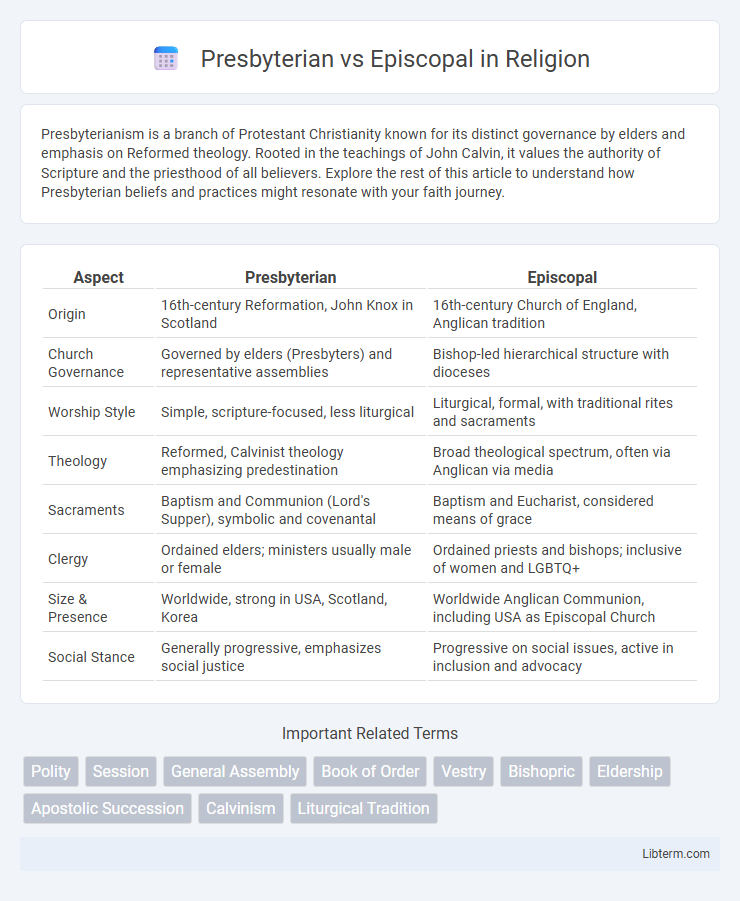Presbyterianism is a branch of Protestant Christianity known for its distinct governance by elders and emphasis on Reformed theology. Rooted in the teachings of John Calvin, it values the authority of Scripture and the priesthood of all believers. Explore the rest of this article to understand how Presbyterian beliefs and practices might resonate with your faith journey.
Table of Comparison
| Aspect | Presbyterian | Episcopal |
|---|---|---|
| Origin | 16th-century Reformation, John Knox in Scotland | 16th-century Church of England, Anglican tradition |
| Church Governance | Governed by elders (Presbyters) and representative assemblies | Bishop-led hierarchical structure with dioceses |
| Worship Style | Simple, scripture-focused, less liturgical | Liturgical, formal, with traditional rites and sacraments |
| Theology | Reformed, Calvinist theology emphasizing predestination | Broad theological spectrum, often via Anglican via media |
| Sacraments | Baptism and Communion (Lord's Supper), symbolic and covenantal | Baptism and Eucharist, considered means of grace |
| Clergy | Ordained elders; ministers usually male or female | Ordained priests and bishops; inclusive of women and LGBTQ+ |
| Size & Presence | Worldwide, strong in USA, Scotland, Korea | Worldwide Anglican Communion, including USA as Episcopal Church |
| Social Stance | Generally progressive, emphasizes social justice | Progressive on social issues, active in inclusion and advocacy |
Historical Origins of Presbyterian and Episcopal Churches
The Presbyterian Church traces its origins to the 16th-century Scottish Reformation led by John Knox, emphasizing governance by elders and adherence to Calvinist theology. The Episcopal Church, rooted in the Church of England, developed during the English Reformation under King Henry VIII, maintaining a hierarchical structure with bishops and a liturgical tradition. Both churches reflect distinct historical developments tied to national and theological contexts in Scotland and England.
Core Theological Differences
Presbyterian theology emphasizes the sovereignty of God, predestination, and a representative form of church government governed by elders (presbyters), reflecting its Reformed roots and adherence to the Westminster Confession of Faith. Episcopal theology centers on apostolic succession, the authority of bishops, and a liturgical worship style rooted in the Book of Common Prayer, emphasizing the sacraments as means of grace within the Anglican tradition. These core theological distinctions shape divergent views on church authority, governance, and the role of tradition in worship and doctrine.
Structure of Church Governance
Presbyterian church governance is characterized by a representative system where elders elected by congregations govern local churches and regional presbyteries, emphasizing collective decision-making. Episcopal governance features a hierarchical structure led by bishops who hold authority over multiple congregations and dioceses, ensuring centralized leadership. The Presbyterian model fosters shared leadership and accountability, whereas the Episcopal system emphasizes episcopal oversight and apostolic succession.
Worship Styles and Liturgy
Presbyterian worship emphasizes simplicity, centered on preaching, Scripture reading, and congregational singing, often following a structured yet flexible liturgy rooted in Reformed theology. Episcopal worship is characterized by a formal, liturgical style with a strong emphasis on sacraments, rites, and the Book of Common Prayer, featuring elements like incense, vestments, and an organized order of worship. The Presbyterian model prioritizes the sermon as the focal point, while Episcopal services balance the Eucharist and liturgical tradition with scripture and prayer.
Role of Clergy and Leadership
Presbyterian churches emphasize a representative form of church government led by elders (presbyters) who are elected by congregation members, with ministers serving as teaching elders within a system of graded courts. Episcopal churches maintain a hierarchical structure with bishops holding authority over priests and deacons, overseeing multiple congregations in dioceses with apostolic succession. The Presbyterian model prioritizes collective leadership and accountability, while Episcopal leadership centers on episcopal authority and sacramental oversight.
Sacraments and Rituals
Presbyterianism typically recognizes two sacraments--Baptism and the Lord's Supper--emphasizing a symbolic and commemorative approach with simple, unadorned rituals. In contrast, the Episcopal Church celebrates seven sacraments, including Baptism, Eucharist, Confirmation, Confession, Matrimony, Holy Orders, and Anointing of the Sick, with richly ceremonial liturgies reflecting Anglican tradition. Rituals in Episcopal worship feature formal prayers, vestments, and the use of incense, highlighting a sacramental theology centered on grace conveyed through sacramental acts.
Approaches to Scripture and Tradition
Presbyterianism emphasizes the authority of Scripture interpreted through a framework of Reformed theology and confessions, upholding the Bible as the ultimate guide for faith and practice with tradition serving a subordinate role. The Episcopal Church balances Scripture, tradition, and reason, valuing the historic creeds and liturgical practices as essential interpretations of biblical truth within the Anglican heritage. This approach allows for a more flexible engagement with modern issues by integrating evolving traditions alongside biblical teachings.
Social and Cultural Influence
Presbyterian churches emphasize community governance and social justice, often engaging in educational initiatives and promoting equality through structured church leadership, reflecting their Reformation roots. Episcopal churches, part of the Anglican Communion, blend tradition with progressive values, influencing culture through liturgical worship, advocacy for inclusivity, and active participation in social issues like civil rights and LGBTQ+ acceptance. Both denominations contribute significantly to social cohesion and cultural dialogue, shaping their communities with distinctive approaches to faith and public life.
Contemporary Issues and Beliefs
Contemporary issues within Presbyterian and Episcopal churches reveal differing approaches to social justice, LGBTQ+ inclusion, and gender equality. The Episcopal Church strongly supports same-sex marriage and ordination of LGBTQ+ clergy, reflecting a progressive stance on human rights and inclusivity. In contrast, Presbyterian denominations vary widely, with some branches embracing similar progressive policies while others maintain more traditional interpretations of scripture and ordination requirements.
Key Takeaways: Choosing Between Presbyterian and Episcopal
Presbyterian churches often emphasize Calvinist theology, governance by elders (presbyters), and a strong focus on scripture and preaching, appealing to those who prefer structured, doctrinal services. Episcopal churches follow an Anglican tradition with a hierarchical governance by bishops, liturgical worship, and a balance between scripture, tradition, and reason, attracting individuals who appreciate formal sacraments and ritual. Choosing between Presbyterian and Episcopal depends on preferences for governance style, worship formality, and theological emphasis.
Presbyterian Infographic

 libterm.com
libterm.com